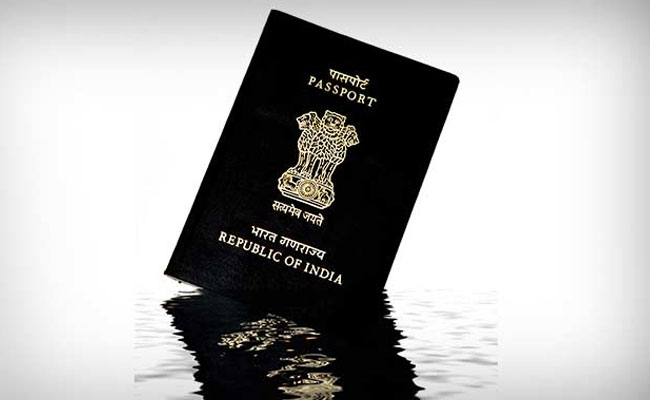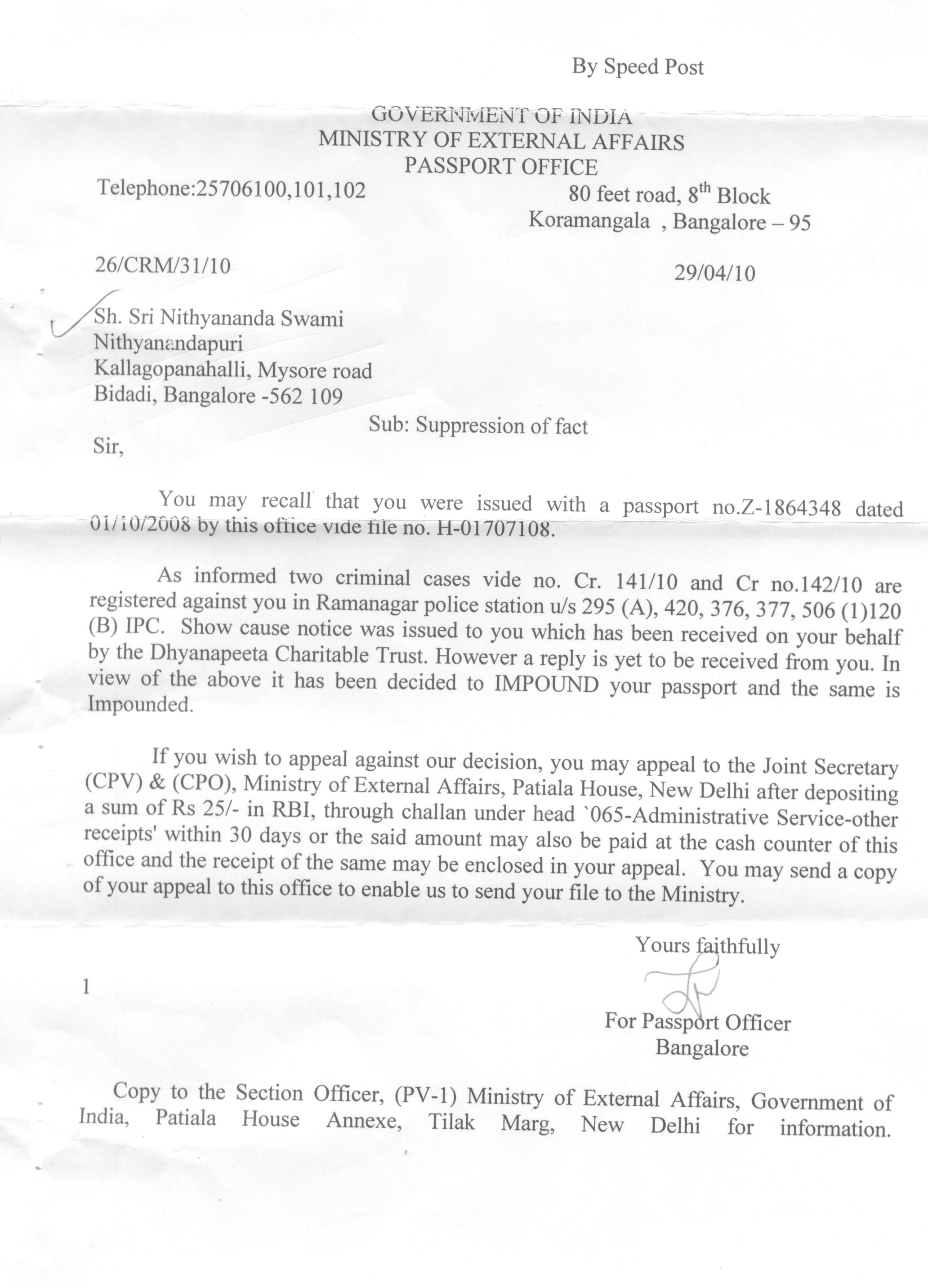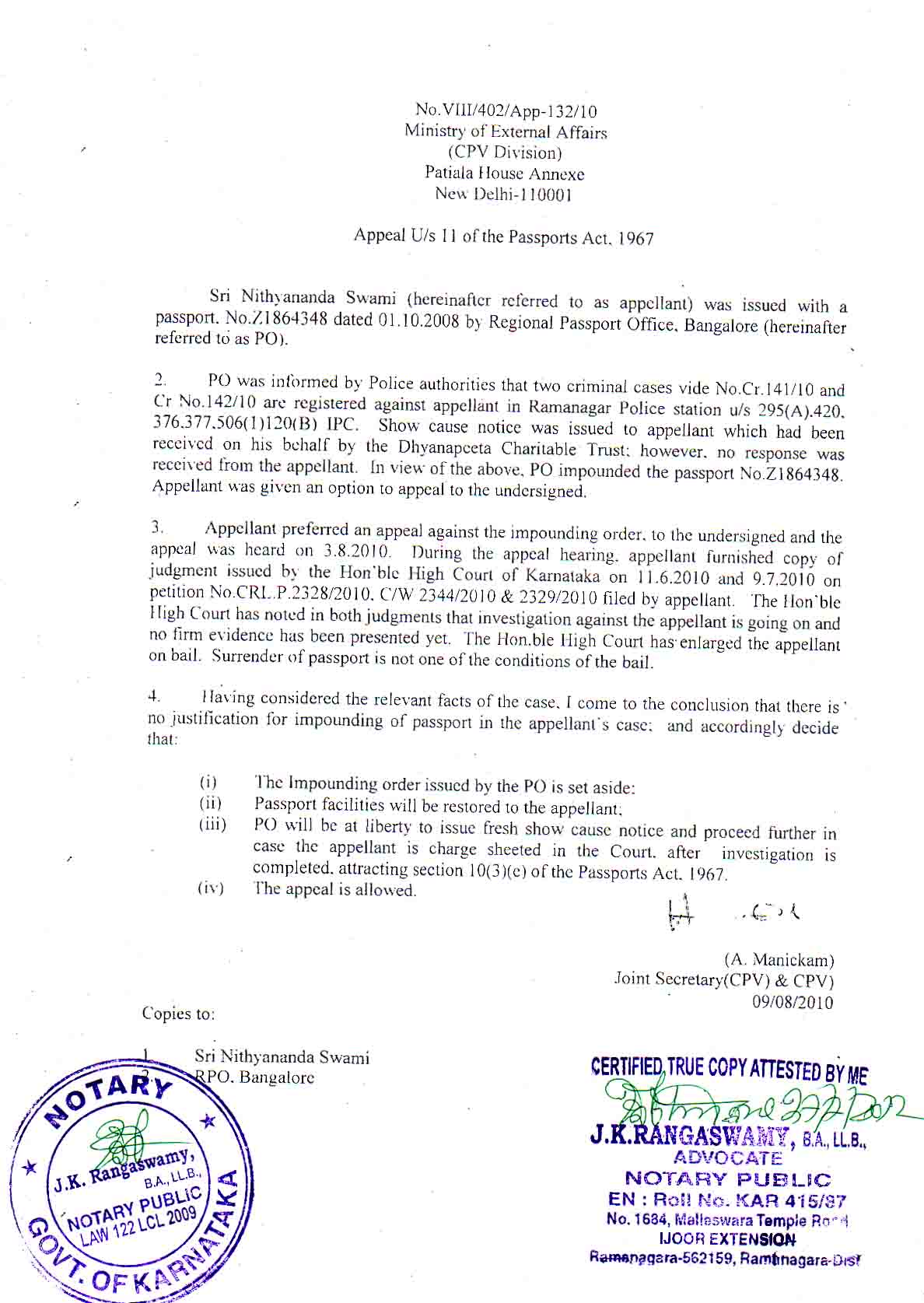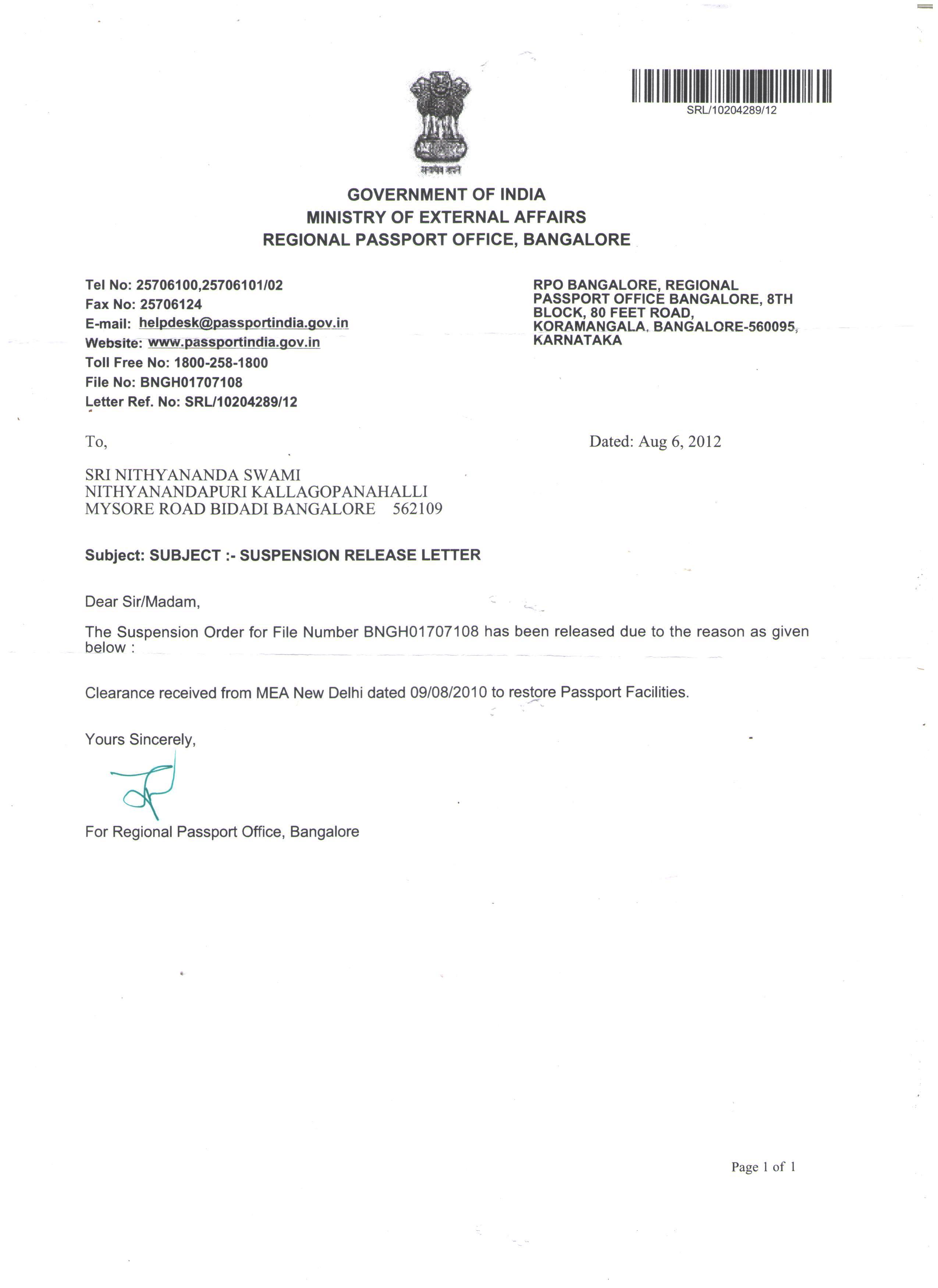29 Apr 2010, Bengaluru
In a brazen mockery of the law, the passport of His Divine Holiness Paramahamsa Nithyananda was illegally impounded on 29 April 2010 with no intimation or justification whatsoever. This was done in the wake of the religious persecution launched by conspirators against His Divine Holiness Paramahamsa Nithyananda on 3 Mar 2010. A false and morphed video was created against Paramahamsa Nithyananda and broadcasted virally through media with vested interest. In a blatant attack against Sanatana Hindu Dharma and the World’s fastest growing Hindu leader Paramahamsa Nithyananda, the persecution was launched.
The Passport Officer issued a show cause notice vide letter Ref: 26/CRM/31/10 dated 15.04.2010 through speed post. The cause notice stated that since two criminal cases vide CR. No.141/10 and CR. No. 142/10 are registered against Paramahamsa Nithyananda at Ramanagar Police station, his passport has cause for impounding. Therefore, in the letter he was called upon to explain as to why action should not be initiated against him under section 10(3) (e) of the Passport Act, 1967. He was further directed to surrender the passport along with a reply within seven days failing which action will be initiated to impound the passport.
His Divine Holiness Paramahamsa Nithyananda was on a spiritual tour in North India at that time and unable to receive the letter personally or attend to the matter.
With no further intimation or allotment of time, the Passport Officer vide his letter dated 26/CRM/31/10 dated 29.04.2010, which was sent by speed post and the same was received in the Ashram on May 3rd 2010, decided to impound the Passport of Paramahamsa Nithyananda stating therein that two criminal cases vide. CR. No. 141/2010 and CR.No.142/2010 are registered against Him, and it has been decided to impound the passport and the same is Impounded!
The order passed by the Passport officer is atrocious and untenable in law and is in violation of the principles of natural justice specially incorporated in section 10 (5) of the Passport Act 1967. The cryptic order is not a ‘reasoned’ order as claimed in u/s 10 (5) of the said Act. The order also doesn’t specify which rule under the said act 1967 is violated for impounding the passport.
The two criminal cases referred to in the order were based on false and frivolous complaints which don’t even disclose the nature of offence whatsoever. If mere registering of a criminal case in a person’s name is treated as a reason for impounding his passport, then 90% of the country’s politicians, few prominent cine actors and many industrialists should have had their passport impounded u/s 10 (3) (e) of the said act.
Till now, not even a single victim has come forward based on the allegations made in the FIR against His Divine Holiness Paramahamsa Nithyananda. It is the first ever case in India registered by the police based purely on hearsay with no victim and no crime alleged!
The action of the police officer taking cognizance of the false complaint and thereafter the Passport officer issuing the notice for impounding the passport without providing any reason, is nothing but a gross violation of Article 21 of Constitution of India, that is the fundamental human rights.
When the impounding letter was sent by speed post, Paramahamsa Nithyananda was already in police custody after His illegal arrest, so it was mandatory on part of the Passport Officer to serve the letter personally t0 Him. The very action of impounding the passport, without serving the said letter personally, is per se illegal, arbitrary and irrational.
Since the impounding of a passport has civil consequences, it is required of the passport authority to give an opportunity of personal hearing to Paramahamsa Nithyananda before impounding His passport. It is a well settled principle of law that any order which has civil consequences must be passed after giving appropriate opportunity of hearing to the party. The impounding of passport is therefore illegal and unwarranted at any level.
The appellant states that the “due process” of law, calling upon the person for a personal hearing and showing the statements and the reasons, before impounding the Passport was not followed by the Passport Officer.
The passport authority before impounding the passport failed to specify the grounds, as set out in section 10(3) and also failed to apply its mind to the facts and circumstances of the case as to really was there any specific grounds existed which would justify impounding of the passport.
The Passport Authority also failed to provide the “reasons” for impounding the passport and this was not only in breach of the statutory provisions of the law but also amounted to denial of opportunity of hearing to the person.
Freedom to go abroad has much social value and represents a basic human right of great significance. It is in fact incorporated as an alienable human right in Article 13 of the Universal Declaration of Human Rights.
Before passing of the unusally ‘prompt’ and final order, the reasons for impounding of the passport were neither disclosed nor a reasonable hearing given. Thus the ‘drastic power’ impounding the passport, was clearly in violation of the rule of natural justice, not conforming with the procedure prescribed by the Passports Act, 1967.
As the Hon’ble Supreme Court in the case of State of Orissa Vs. Binapani Dei [Air 1967 SC 1269] has observed that “An order by the State to the prejudice of a person in derogation of his vested rights may be made only in accordance with the basic rules of justice and fair play. The deciding authority, it is true, is not in the position of a Judge called upon to decide an action between contesting parties, and strict compliance with the forms of judicial procedure may not be insisted upon. He is however under a duty to give the person against whom an enquiry is held an opportunity to set up his version or defence and an opportunity of correct or to controvert any evidence in the possession of the authority which is sought to be relied upon to his prejudice. For that purpose the person against whom an enquiry is held must be informed of the case he is called upon to meet, and the evidence in support thereof. The rule that a party to whose prejudice an order is intended to be passed is entitled to a hearing applies to judicial tribunals and bodies of persons invested with authority to adjudicate upon matters involving civil consequences. It is one of the fundamental rules of our constitution ‘setup that every citizen is protected against exercise of arbitrary authority by the State or its officers. Duty to act judicially would therefore arise from the very nature of the function intended to be perform; it need not be shown to be super-added. If there is power to decide and determine to the prejudice of a person, duty to act judicially is implicit in the exercise of such power. If the tails of justice be ignored and an order to the prejudice of ‘a person is made, the order is a nullity. That is a basic concept of the rule of law and importance thereof transcends the significance of a decision in any particular case.”
The Passport Office revoked the suspension in August 2010.
However, the order which took just 2 weeks to take effect of impounding took a whole 2 years to become effective when finally His Divine Holiness Paramahamsa Nithyananda’s passport was released. Below is the release order after two long years.




